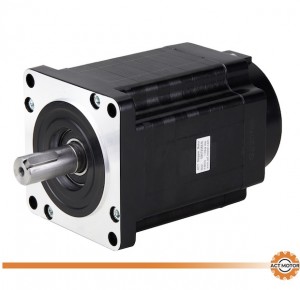Stepper motors and servo stepper motors are both important control components in the industrial drive control field and have a wide range of applications, and you may need both of them. You may think these two kinds of motors are similar, but some significant differences exist between them. If you’re not quite clear on the differences, here’s a basic breakdown to help clear things up and make correct decisions when buying a stepper motor or a servo stepper motor.
What is a stepper motor?
A stepper motor refers to a brushless, synchronous electric motor that moves in discrete steps with a number of coils arranged in phases. The stepping movement of the motor allows for a great deal of speed control and precision. It is well suited to the applications where control signals appear as digital pulses rather than analog voltages.
 What is a servo stepper motor?
What is a servo stepper motor?A servo stepper motor is a closed-loop motor that is linked to an encoder that provides position and speed feedback, which is used to determine its movement. The controller sends an error signal to the motor if it is not in the right position, signaling it to continue its movement until it reaches the desired position. The servo motor can accurately control speed and position accuracy.
Stepper motor vs. servo stepper motor
Which motor is right for your needs? ACT Motor, one of China top 10 stepper motor manufacturers, suggests you choose a stepper motor if precision and control are your priorities, or a servo stepper motor is usually better if you value speed most. To help you make the correct decision, here five differences between them are further explained. 1. Different control accuracy.Two-phase hybrid stepper motor usually has a step angle of 1.8°, three-phase hybrid stepper motor has a step angle of 1.2°, and high-performance stepper motor even has a smaller step angle. The control accuracy of the AC servo stepper motor is guaranteed by the rotary encoder at the rear of the motor shaft. For a servo motor with a standard 2500-line encoder, the pulse equivalent is 360°/10000 = 0.036° due to the quadruple frequency technology used inside the driver. It’s unnecessary to pursue the highest accuracy of the motor, for neither mechanical drive accuracy nor position accuracy through photoelectric sensors is higher than the physical accuracy of stepper motor or servo stepper motor. 2. Different torque frequency.The output torque of a stepper motor decreases with the increase of speed, and decreases sharply at higher speed, so its maximum speed is generally from 0 to 900RPM. AC servo stepper motor has constant torque output, so it can output rated torque within its rated speed (generally 1000~3000RPM). 3. Different operation performance. 4. Different speed response performance. 5. It takes 100 to 2000 milliseconds for a stepper motor to accelerate from standstill to operating speed. AC servo stepper motor has better acceleration performance, accelerating from standstill to its rated speed of 3000RPM in a few milliseconds, which can be used in control situations requiring fast start/stop.
source:https://www.act-motor.com/news/differences-between-stepper-motors-and-servo-stepper-motors/
Media Contact
Company Name: Chang Zhou ACT Motor Co.,Ltd
Email: Send Email
Phone: 0086-519-81189628
Address:No.18, Boyang Road, Jintan Area
City: Changzhou
State: Jiangsu
Country: China
Website: https://www.act-motor.com/
